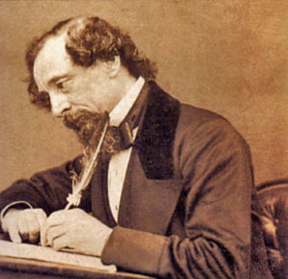(LONDON (Reuters) – Queen Elizabeth is throwing a star-studded party for him at Buckingham Palace and in Buenos Aires, leading cultural figures will gather in an old orphanage to read from his works.
Charles Dickens may have died in 1870, but legions of fans around the world unite next Tuesday and beyond to celebrate the 200th anniversary of the birth of a titan of English fiction.
In one sense, the story of the author of familiar classics like A Christmas Carol, Bleak House and A Tale of Two Cities is thoroughly modern.
The journey from childhood poverty which deeply influenced the work and thinking of Dickens to international renown for his novels bears comparison to that of JK Rowling, dubbed the world’s first billionaire author.

Commercially, his books eclipse Harry Potter or any other modern-day publishing phenomenon — some estimates say A Tale of Two Cities is the best-selling novel of all time at more than 200 million copies.
Stories featuring household names like Samuel Pickwick, the orphan Oliver Twist and miser Ebenezer Scrooge remain in print and live on in hundreds of films, television series and plays, and there is no sign of the adaptations letting up.
Director Mike Newell is working on the highest-profile new screen version of Dickens work with Helena Bonham Carter and Ralph Fiennes starring in Great Expectations.
The appeal, say experts, is that as well as writing gripping stories, Dickens remains relevant today.
“He surprises you constantly, shocks you constantly, moves you, but for me the flame of anger about inequity and poverty and cruelty, that’s what endures for me,” said Sarah Phelps, who wrote a TV version of Great Expectations for the BBC.
“Any writer wants their work to live on,” she told Reuters. “I think he would be pleased that what he felt strongly about then, people still do now.”
Dickens’ early experiences labouring as a child in a factory while his father sat in prison for unpaid debts fuelled his ambition and inspired some of his most famous characters and settings, probably including Fagin in Oliver Twist.
His sense of anger at the social injustice of Victorian Britain runs through his work and helps explain his appeal to later generations.
“He was making the world want to read about the state of the British under-class,” TV writer Paul Abbott told the BBC.
Dickens’ first short story appeared in 1833, around the time he became a parliamentary reporter in London.
His first novel, The Pickwick Papers, was serialized in 1836 and became a success, and was followed by Oliver Twist and Nicholas Nickleby.
Dickens travelled to the United States in 1842 and 1867 on reading tours, and in between produced some of his most acclaimed books — Bleak House, Hard Times, Little Dorrit, A Tale of Two Cities and Great Expectations.
He carried with him the whiff of scandal when, in his mid-forties, he met teenager Ellen Ternan, and their relationship led to his separation from Catherine, his wife and mother to his 10 children.
The author died at his home near Rochester in Kent in 1870 aged 58, and was buried in the Poet’s Corner of Westminster Abbey. Thousands of people visited his open grave to pay their respects and throw flowers before it was closed.
On Tuesday, the bicentenary of his birth, Britain’s heir-to-the-throne Prince Charles will visit the Charles Dickens Museum in London where the author lived between 1837 and 1839 and wrote Oliver Twist and Nicholas Nickleby.
The prince will go on to Westminster Abbey to attend a ceremony and lay a wreath on Dickens’ grave, the centerpiece of the February 7 anniversary events that spread from Australia to Argentina, and Iraq to Russia.
The Abbey event also marks the largest gathering of the novelist’s descendants, with over 200 family members attending including his great-great grandson Mark Dickens.
“This bicentenary should help renew our commitment to improving the lot of the disadvantaged of our own day,” said the Dean of Westminster, John Hall.
Prince Charles’ mother, Queen Elizabeth, attends a performance of extracts from Dickens’ works on February 14 before hosting a reception at her London residence.
On February 7, the British Council will stage a global “read-a-thon” with 24 readings from 24 Dickens texts in 24 hours, starting in Australia and taking in countries including Iraq, China and Pakistan.
Ongoing events coinciding with the anniversary include exhibitions in Zurich, New York and across Britain, theatrical performances by professional actors and schoolchildren alike and an online tribute from bloggers in Spain.





